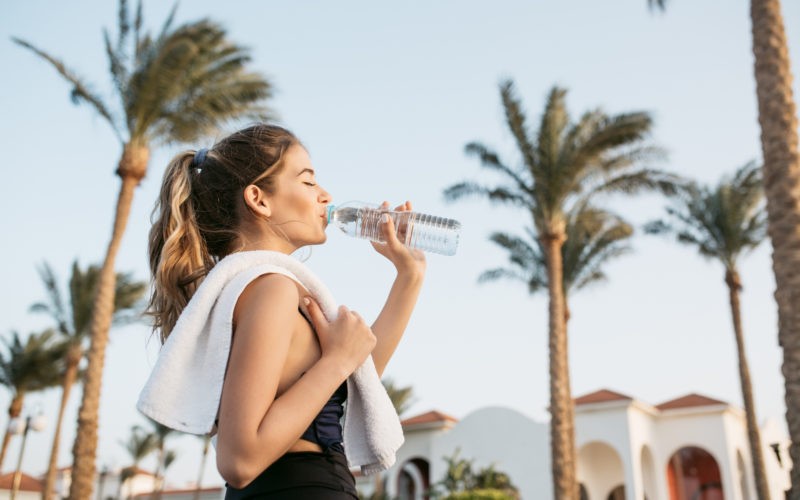Are you ready for your next vacation but worried about staying healthy and hydrated along the way? From battling the travel fatigue of long flights to adjusting to unfamiliar climates and foods, travel can take a toll on your body. With the right strategies, you can stay energized, hydrated, and in peak form, ensuring that every moment of your adventure is as enjoyable as you’ve imagined.
Jumpstart Your Vacation with Healthy Preparations
Proper preparation sets the tone for a healthy vacation. Start by hydrating your body days before you travel. Increasing your water intake a week prior helps your body adapt to the upcoming changes, including different climates or extended periods of activity. Bring a reusable water bottle with a built-in filter, especially if you’re traveling internationally, to ensure safe drinking water is always accessible.
Choose water-rich foods like cucumbers, oranges, and watermelon, which help quench your thirst and provide vital nutrients for bone and joint health and blood circulation. Avoid salty or sugary snacks like chips or candy, as they can dehydrate you. Incorporating supplements for bone health into your routine can also help maintain strong bones during your travels. While traveling to your next vacation, consider these essential tips to stay hydrated and healthy.
Stay Hydrated Throughout the Day
Once you’ve arrived, establishing a hydration routine is key. Start your day with a glass of water to kickstart your metabolism and stay hydrated before meals. Use phone reminders to sip water every 30–60 minutes, especially during long sightseeing excursions or physically demanding activities. The CDC reports that 75% of Americans suffer from chronic dehydration, and this risk is compounded when traveling due to increased activity, and irregular hydration patterns.
For an extra edge in hydration, consider learning how to use a hydrogen water bottle. Hydrogen-infused water is known for its antioxidant properties, which may help reduce fatigue, speed up recovery, and improve overall hydration efficiency.
It is good to recognize the signs of dehydration early. Tiredness, dry mouth, and headaches can creep up on you without notice, especially in warmer climates. If you notice these symptoms, address the issue immediately by drinking water and snacking on hydrating fruits like watermelon or grapes.
Hydrating foods in your diet can also help. Incorporating more salads, smoothies, and soups will nourish your bones and joints while hydrating. Instead of soda, get fresh juices or herbal teas when going out to eat.
Combat the Challenges of Air Travel
Air travel presents unique hurdles to staying hydrated. The cabin’s low humidity levels and pressurized environment can dehydrate you quickly. To combat this, aim to drink at least one full glass of water for every hour of flight time. Avoid alcohol and caffeinated beverages, as they contribute to water loss and leave you feeling fatigued.
Pack essentials, such as electrolyte powders or tablets, that replace lost minerals due to the effects of long flights. Also, apply hydrating products like lip balms and facial sprays to your skin in this dry cabin environment.
Moving and stretching frequently also helps. A few repetitions of simple exercises on a flight, like rolling your ankles or taking short walks, can make blood flow much better, reduce swelling, and ensure arrival feeling refreshed.
Dehydration Risks in Travel
| Travel Condition | Dehydration Risk | Hydration Tips |
| Air Travel | High – Low humidity and pressure | Drink water hourly; avoid alcohol and caffeine |
| Hot Climates | Very High – Heat drains fluids faster | Use cooling towels, and hats, and increase water intake |
| Cold Climates | Moderate – Thirst suppressed | Drink warm teas or broths; monitor intake |
| Active Vacations | High – Sweat and exertion | Use electrolyte drinks; carry hydration packs |
Health Tips for Various Travel Conditions
Hot Climates
Hotter destinations require increased vigilance to avoid dehydration. The heat drains body fluids faster, so it’s important to drink more water than usual. Use cooling towels and wear hats to protect yourself from heat exhaustion. Always carry a portable fan or umbrella for added relief in extreme temperatures.
Cold Climates
Cold weather will decrease your level of thirst, but your body will still lose moisture due to both respiration and sweating. Hydration is just as important in cold conditions. Hot liquids, including herbal teas or broths, will hydrate you while also warming you up.
Active Vacations
In cases where physically demanding activities such as hiking or skiing will be undertaken, hydration becomes crucial. Hydration packs or water bladders must be carried during activities for convenient access to water. Electrolyte drinks can also replace lost minerals due to sweat and thus maintain blood circulation and energy.
Make Smart Food and Beverage Choices
The foods and drinks you consume during your vacation play a significant role in maintaining hydration and overall health. Limit alcohol consumption, as it dehydrates your body quickly. If you do indulge, alternate each alcoholic drink with a glass of water. Lighter options like spritzers or mocktails are excellent choices.
Minimize your caffeine intake, especially from coffee or energy drinks, which can disrupt hydration. Instead, try green tea or herbal teas, which are gentler on your body and support bone health with their antioxidant properties.
Purchase fresh, locally sourced fruits and vegetables whenever possible. Seasonal fruits and vegetables not only hydrate but also nourish your body with essential nutrients that will keep you energized and healthy during your journey.
Maintain General Health While Traveling
Hydration is just one piece of the puzzle when it comes to staying healthy while on vacation. Prioritize sleep by maintaining a consistent schedule, even when crossing time zones. Adequate rest helps prevent fatigue and ensures that your immune system functions at its best.
Avoid overexerting yourself by balancing activity with downtime. Overpacked itineraries can lead to burnout and dehydration. Listen to your body, take breaks when needed, and don’t hesitate to adjust your plans for a healthier pace.
You should also practice good hygiene. Washing one’s hands regularly will prevent illness that may hamper hydration or overall well-being. Hand sanitizers and hand sanitizing wipes come in handy when in crowded tourist destinations.
Quick Solutions for Emergency Dehydration
Sometimes, dehydration can happen despite your best efforts. Pack oral rehydration solution (ORS) packets in your travel kit as a precaution. These can quickly restore your body’s fluid and electrolyte balance during emergencies.
If dehydration symptoms persist, such as dizziness, confusion, or dry skin, seek medical attention immediately. Severe dehydration can escalate quickly, and it’s always better to prioritize your health in such situations.
FAQs
1. How much water should I drink daily while on vacation?
You should aim to drink at least 8–10 glasses of water daily. If you’re in a hot climate or engaging in physical activities, increase this amount to compensate for additional fluid loss.
2. How can I drink enough water while traveling?
Therefore, make a pact with yourself or your travel companions to drink at least one glass of water before or after any meal, and at least one glass when you’re snacking. For even better hydration, choose foods with high water content, like fresh fruits and vegetables, ideally prepared without added sodium.
3. Why do I get dehydrated on vacation?
Sometimes dehydration occurs for simple reasons: You don’t drink enough because you’re sick or busy, or because you lack access to safe drinking water when you’re traveling, hiking, or camping. Other dehydration causes include: diarrhea and vomiting.
Conclusion
Staying hydrated and healthy on a trip is entirely possible with proper planning. Prepare your body before you hit the roads and make choices while you are on the move, staying hydrated and feeling great about yourself for the rest of the trip. Use your next trip not just as an experience, but also as a chance to enjoy how incredible it feels to stay healthy and hydrated. Focus on your health, stay aware of your surroundings, and make the most of every moment of your adventure.












